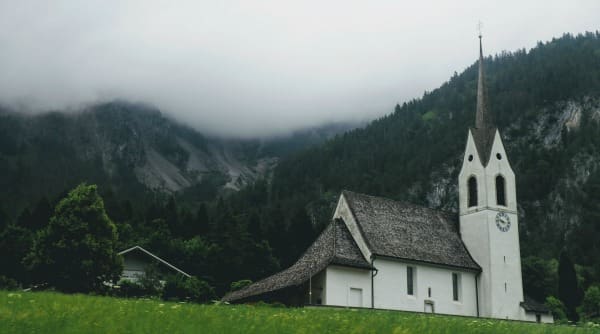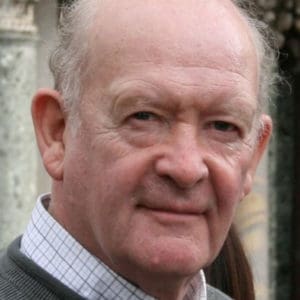MINI-COURSE ON PRAYER
SECTION 2 CHRISTIAN MEDITATION
Part 18 – The Little Back Shop

Editor’s Note: in part 17, David Torkington discussed how it is love that animates all Christian asceticism and makes possible even severe sacrifices. This week he expounds on the need to carve out time and space to pray, and how we know God through love, not through knowledge alone.
My doctor once gave me a medication that he said must be taken once a week without fail. He said, take it religiously, and by that, I mean before each Sunday Mass, then you will not forget. Perhaps Sunday would be a good time to set aside some time to begin learning how to meditate. Set aside twenty minutes to half an hour to learn the prayer that can totally change your life. Then, gradually try to find time to integrate it into your daily life. After my mother died I would always spend a few weeks each year with my father until he died. To give him a little respite from meals on wheels I would do the shopping and cook for him. In the course of time, I became very friendly with the girl who served at our local supermarket because she seemed so transparently kind and understanding. When she found out what I was doing, and why I could not be at home all the time, as I would have wished, she promised to pop in to see my father every few days and keep me informed. She and her husband would also invite him for Sunday lunch. She was an Australian girl, so on my last visit to the shop, I asked her whether or not she and her husband had seen the magnificent program that my father and I had watched on the Great Barrier Reef the previous evening. She said they did not watch much television. They were both committed Christians, who went on retreat twice a year to a monastery near Hereford. They spent their evenings reading books and meditating. So that was the source of her inner strength!
Some Time for Solitude
I am not suggesting that the television should go, but when you read that the average viewer watches over thirty hours of programs a week, surely something could be done to save our sanity. Reducing that time by a third would give us more than enough time to start doing the only thing that can permanently change our lives for the better. One way or the other, if we are going to be serious about finding time for prayer, we will have to find what Montaigne called, a little back shop for ourselves, all our own, untouched by others, in which we establish our true freedom and chief place of seclusion and solitude. You will need this for the deeper form of prayer, where the closeness to God that you have at times experienced but briefly, will develop through meditation to profound mystical contemplation. It is this that will gradually lead to the most important prayer of all. The first Christians called this prayer ‘the prayer without ceasing’. St Catherine of Siena found a room ‘far from the madding crowd’ in her own home. Sadly, in this world of noise that now prevails, we might not be able to do the same. However, the local church could be our refuge. If it is locked ask the parish priest to give you a spare key. It should be a great joy for him to see that at least one of his parishioners is set on doing what all the others could be doing too. If it is thought to be too dangerous to leave the church open during the day, then arrange for a rota of parishioners to ensure there is always a presence there, at least at certain times during the day. This venture would also give the parish priest the opportunity to arrange for talks to teach people how to pray in the time they have given. Admittedly, it was during and in the immediate aftermath of World War II, but whenever I went into a church during the day as a boy, there were always many others who had come in to pray, and the city churches were often more than half full. Does it take another war to get us back to prayer again?
The Crèche Where Saints are Made
Whilst great intellectuals usually reach the height of their powers in their twenties or early thirties it is quite different for those seeking to quench their thirst for love. Their desire for love and their capacity to receive it continues to grow in this world and the next. That is why St Gregory of Nyssa had to make up a new word to describe this incredible phenomenon. Epecstasy was the word he used, as we have seen. It is because God’s love is infinite that we can go out of ourselves again and again into that love forever because God’s love is infinite. Although that is what will happen to us in the next world, it will only begin to happen to us in this world if we are continually open to receive God’s love. That is why prayer is so important, because that is where supernatural love is generated, as the divine and the human interact, meeting, mixing, merging and becoming as one.
Something that is of Utmost Importance
Earlier I quoted the Benedictine, William of Saint–Thierry, the good friend of St Bernard who said, “You will never love someone unless you know them, but you will never really know them unless you love them.” That is why the highest and most profound knowledge of God comes not through knowledge alone, but through love – our love. This happens when through prayer it is suffused and surcharged by the divine. That is why, when at the end of his life St Thomas Aquinas experienced the love of God, with such all-consuming power he said something astounding. He said that all he had written before, namely his great Summa Theologica was no more than straw compared with the new knowledge that comes through the love that is wisdom. The consequences of what he said are even more astounding for us personally. Very few of us have intellects like St Thomas Aquinas. Even less have even a fraction of the knowledge contained in his great magnum opus, but if we only learn to open ourselves to receive God’s infinite love that comes to us in prayer, then something dramatic happens. The Holy Spirit will give even the simplest and humblest of us the profound knowledge that is even beyond the grasps of some of the most learned professors of theology.
Wisdom from Evagrius Ponticus
It is, for this reason, the great mystical theologian and hermit Evagrius Ponticus (AD 345- 399), whose writings summed up the teaching of the Desert Fathers with whom he lived, said, “A person of prayer is a theologian, and a theologian is a person of prayer.” It is there alone that true spiritual wisdom is learned. In the nineteenth century, crowds flocked not to the great theologians of the day in search of wisdom, but to a simple country priest, the Cure d’Ars. In the same way in the twentieth century it was to a simple Franciscan Friar, Padre Pio to whom they flocked for the spiritual help they needed, or to Lourdes or Fatima or other places where Our Lady had called people to prayer time and time again. Her message is always the same – “Turn back to prayer”, for it is here that the selfless giving is learnt that enables our love to be suffused and surcharged by the divine. It is this love alone that can change us permanently into the persons God created us to become from the very beginning. This will enable us, “to love and serve him in this life and to be happy with him in the next,” as the catechism used to put it so succinctly.
These ideas are developed further in my two major works on prayer – Wisdom from the Western Isles and Wisdom from the Christian Mystics, and Wisdom from Franciscan Italy that show how deep contemplative prayer grows to perfection.
+
Photo by Natalia Y on Unsplash



